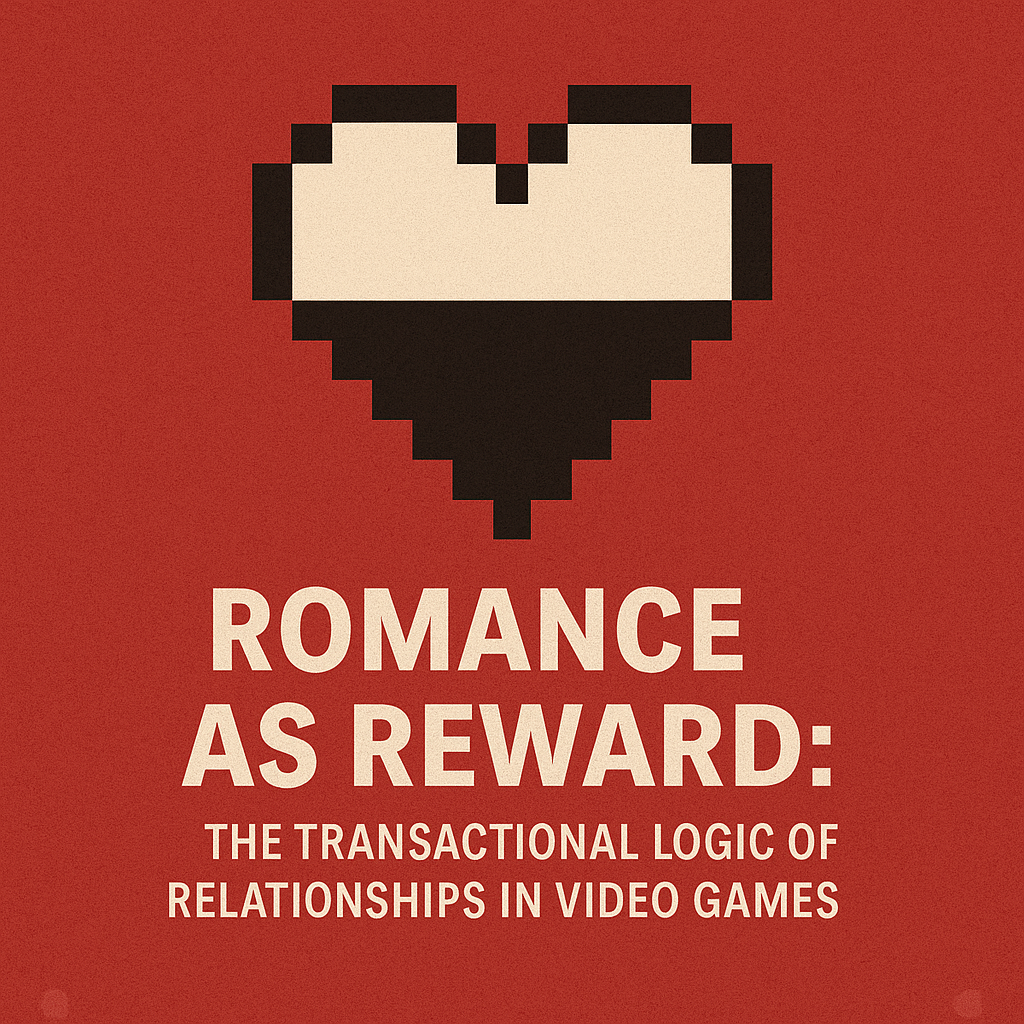Romance as Reward: The Transactional Logic of Relationships in Video Games and Its Psychological Implications
In many contemporary video games, romantic relationships are built on a predictable and reward-based logic. Players initiate conversations, select favourable dialogue options, give specific gifts, and eventually unlock a romantic or sexual encounter. This structure is especially prominent in role-playing games (RPGs), dating simulators, and social simulators. While this design provides a sense of progress and control in an otherwise complex domain of human interaction, it also promotes a model of relationships that is fundamentally transactional. The question worth asking is whether these patterns, repeated across countless games and hours of gameplay, shape players’ understanding of intimacy, love, and interpersonal connection in real life.
The Transactional Model in Game Design
Game design often requires simplification. Developers must translate intricate human experiences into quantifiable systems. Romance, with all its emotional ambiguity and unpredictability, is particularly challenging to code. To solve this, many games resort to mechanics that mirror a behavioural conditioning framework—rooted in the psychological theory of operant conditioning. In this model, behaviours are shaped by their consequences. When a player performs a desirable action; such as choosing the “right” dialogue or giving a favoured gift—the game responds with a positive outcome, such as increased affection from a character. This creates a loop where players learn to associate certain behaviours with predictable relational outcomes.
This loop is similar to the behavioural psychology experiments of B.F. Skinner, who demonstrated how animals could be trained to perform tasks through reinforcement. In a game context, affection points or heart meters serve as reinforcement schedules. The game rewards the player with progressing intimacy, ultimately leading to a climax, often literal in the form of sex scenes or exclusive romantic cutscenes. From a game mechanics perspective, this approach is efficient and familiar. From a psychological standpoint, however, it frames romance as a system of inputs and outputs, rather than mutual emotional resonance.
Cognitive Scripts and Social Learning
According to social learning theory, individuals develop expectations and behavioural scripts by observing and internalizing the models presented including those in media. These scripts guide how people interpret social situations and how they believe they should act within them. Repeated exposure to transactional romance mechanics in games can reinforce a script where relationships are seen as tasks to complete or challenges to overcome, rather than organic processes grounded in mutual understanding.
This is especially influential in adolescents and young adults, who often use media as a source of guidance in navigating relationships. For players with limited real-life romantic experience, these scripts may become default templates. If affection is consistently shown as something to be earned through correct behavior, rather than something reciprocal and negotiated, it may foster a distorted view of consent, emotional availability, and personal boundaries.
Gamified Intimacy and Emotional Labor
Another psychological concept relevant here is emotional labour, the process of managing feelings and expressions to fulfil the emotional requirements of a situation. In games, emotional labour is externalized into a mechanic. Players must learn what each character wants, manage their moods and say the right things at the right time. While this can encourage empathy and perspective-taking, it can also reduce emotional connection to a task list.
In the real world, intimacy requires vulnerability, authenticity, and mutual growth. When intimacy is portrayed as the result of persistent effort without real emotional risk, it loses depth. The player never has to face genuine rejection, miscommunication, or unresolved feelings. Everything is manageable and predictable. This may desensitize players to the emotional complexity of real-world connections and prime them to seek control and certainty in situations that are inherently uncertain.
Entitlement and the Illusion of Reciprocity
One of the more concerning psychological consequences of this design is the reinforcement of entitlement. If games consistently teach players that positive attention and gifts lead to romantic or sexual access, this may foster unrealistic expectations in real life. It risks cultivating a mindset where affection is something that can be "earned" through persistent effort, regardless of the other person’s feelings or autonomy.
This kind of thinking aligns with what psychologists call “communal narcissism” a belief that one’s generosity or kindness should be rewarded with love and admiration. When that reward is not forthcoming in real life, it can lead to frustration, resentment, or even aggressive behaviour. While most players are capable of distinguishing game mechanics from real-world ethics, these attitudes can subtly influence relational expectations, especially if they are reinforced across multiple media and social environments.
Not All Games Are the Same
It is important to note that not all games reduce romance to a set of transactions. Some titles, especially in the indie space, have begun to explore relationships with more nuance. Games like “Night in the Woods” or “Life is Strange” present intimacy as layered and sometimes unresolved. Others, such as “Boyfriend Dungeon,” incorporate discussions of boundaries, consent, and emotional readiness. These narratives challenge the idea that relationships are trophies to be won and instead position them as experiences to be navigated with care.
Furthermore, players are not blank slates. Many are media literate and capable of critically engaging with the content they consume. They may enjoy the mechanics without internalizing them, just as someone might enjoy a violent film without endorsing real-life violence. Nevertheless, it remains true that when a particular model is repeated often enough, it begins to shape cultural norms and individual expectations.
Toward More Relationally Literate Design
What can game developers do to design relationships that feel more authentic? First, they can shift from outcome-based design to process-based design. Instead of affection meters and gift thresholds, they can emphasize character development, emotional dialogue, and realistic consequences. Characters could reject the player, change their minds, or struggle with their own internal conflicts. These experiences may be less tidy but more emotionally resonant.
Second, designers can represent a broader spectrum of relationships, not just romantic or sexual, but also platonic, familial, and ambiguous ones. This reflects the diversity of human connection and helps break the fixation on romance as the ultimate reward.
Finally, games can encourage introspection. Titles that allow players to reflect on their choices, question their motives, or explore emotional vulnerability offer opportunities for psychological growth. Just as stories in books or films can expand empathy and understanding, games have the potential to do the same; provided they resist the urge to reduce everything to points, progress bars, and predictable rewards.
Simply Put
Romantic relationships in video games are often designed with clear mechanics and goals. While this provides clarity and engagement from a gameplay perspective, it also reinforces a transactional model of intimacy that may shape players’ expectations and behavior in real life. Through the lens of psychology, we see how game mechanics intersect with operant conditioning, social learning, emotional labor, and entitlement. As games continue to evolve as a medium, there is a growing opportunity—and responsibility—for developers to design relationships that reflect the complexity, uncertainty, and beauty of real human connection.






